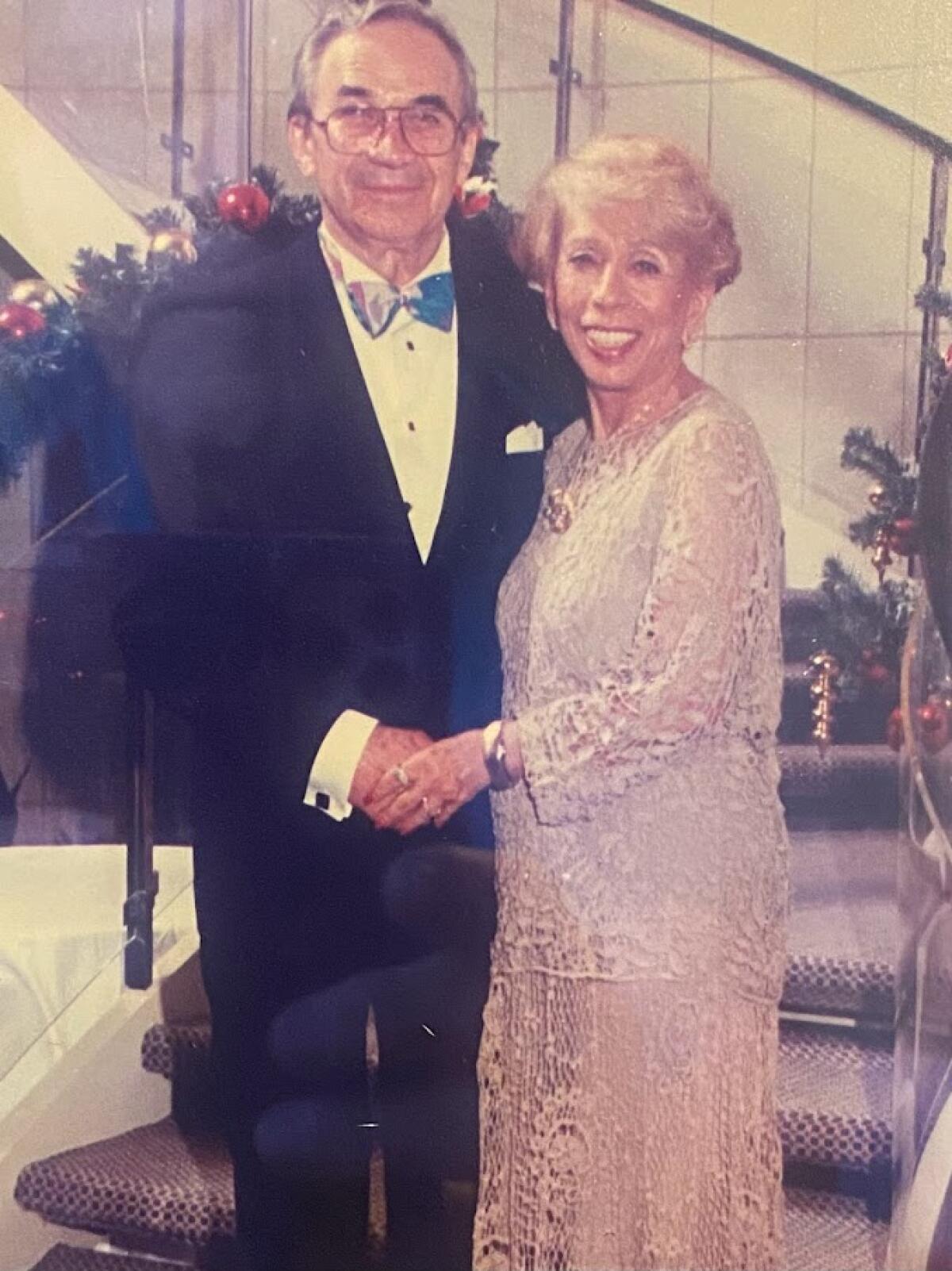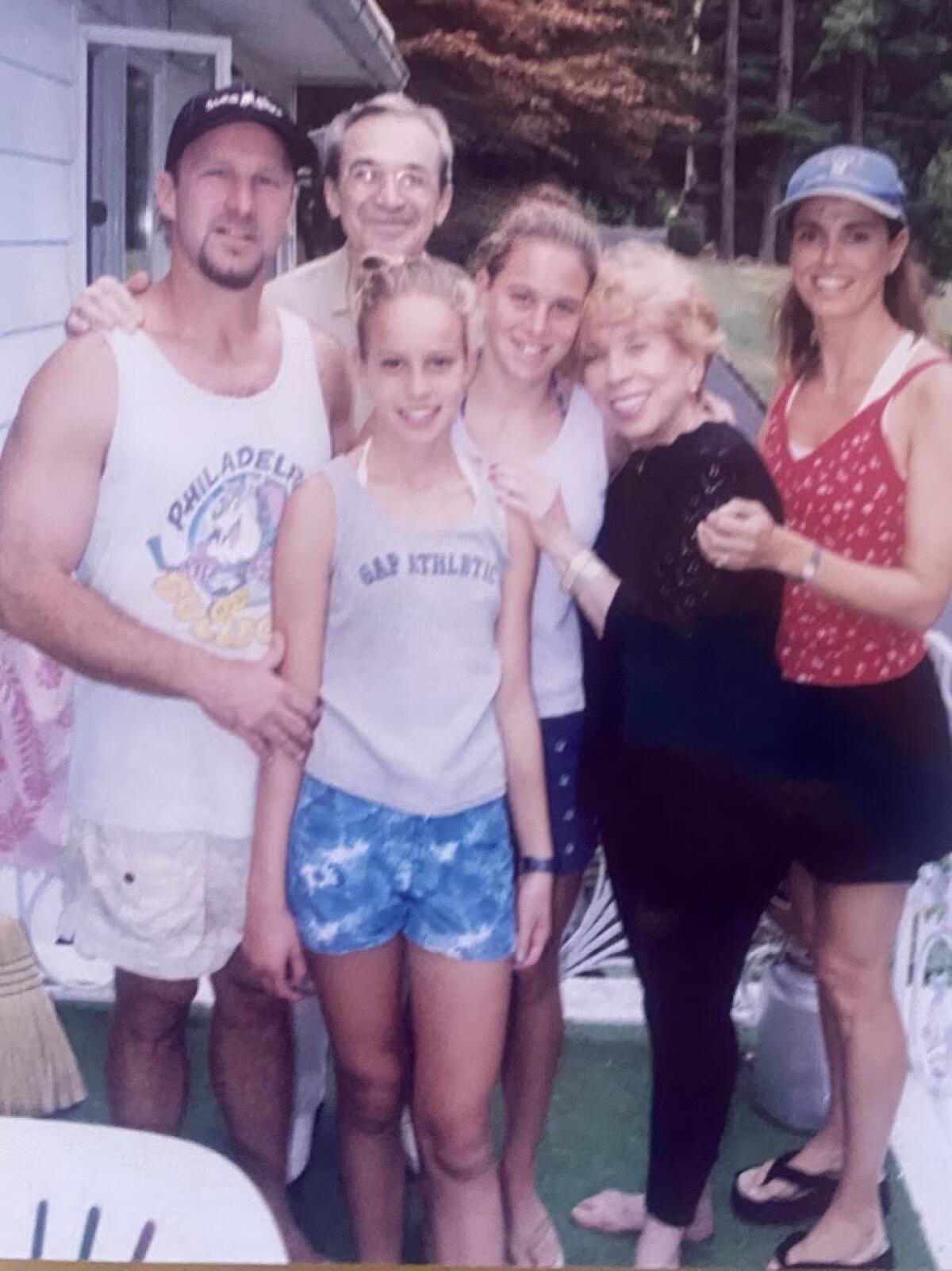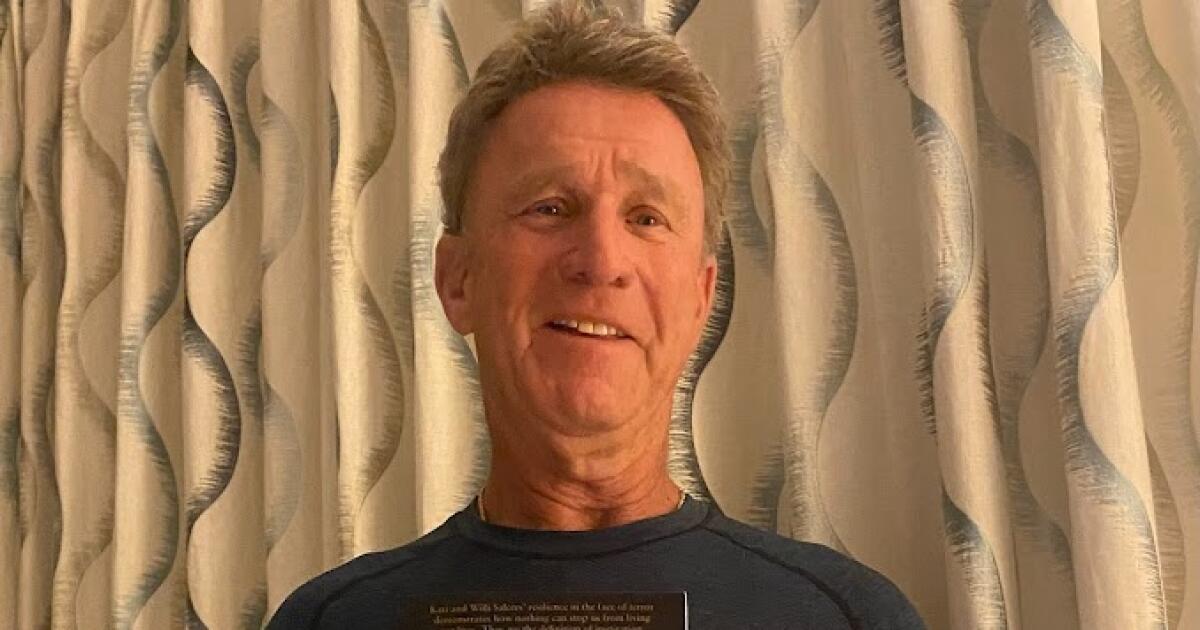Column: Holocaust survivors’ son, a pro hockey agent, tries to keep their memory alive
Ron Salcer knew that his brilliant father had secured patents on 16 inventions that ranged from plastic table cloths to unbreakable roller hockey pucks, and he sensed that William Salcer’s physical and mental strength had allowed him to survive the Holocaust and make a new life.
Ron knew his mother, Katarina, also from a small town in Czechoslovakia, was a Holocaust survivor, too. He was aware her family had been wiped out. “I never met a grandparent, never met an uncle, I never met a cousin,” Ron said. “I had one aunt, my father’s sister, who survived also.”
But he didn’t know about the horrors William endured at the infamous Mauthausen concentration camp, or that in a heart-stopping moment Nazis chose Katarina to work rather than be killed because she was young and strong. He didn’t know William was force-marched through Austria, or that Katarina was limited to 10 sips a day of rotten soup at Auschwitz.
Willi and Kati, as they were known, refused to discuss any of it. Not when Ron was young. And not after they emigrated to Israel and then to New York, where Ron grew up before he moved to Southern California and launched a successful career as an agent for hockey players. His clientele included many members of the Kings and seven Hall of Famers.
In his job, Ron bravely fought for players’ rights and helped unseat the unscrupulous Alan Eagleson as head of the NHL Players’ Assn. But for a long time Ron didn’t know the true meaning of bravery because his parents refused to describe how they’d survived after being herded into a Jewish ghetto and sent to concentration camps.
“They never went into any detail. And if I ever tried to talk about it, they would go in a different direction,” said Ron, who was born in Israel. “I don’t know how my mother or father were able to put their head on the pillow and compartmentalize their life the way they did after what they saw, and how much they suffered. Yet, they had the courage to pick themselves up and close that chapter and move on in their lives, have incredible joy and success and children and grandchildren, and everything they did.”
Ron’s life changed when he saw Steven Spielberg’s “Schindler’s List.” The 1993 movie about industrialist Oskar Schindler saving the lives of more than 1,000 Jews sharpened Ron’s curiosity about his parents’ ordeal, prompting him to ask them to tell their story for his two daughters, his sister’s three kids and for posterity. Willi and Kati agreed to speak to the USC-based Survivors of the Shoah Visual History Foundation, reliving their pain as they were filmed separately and together.
Ron was overwhelmed when he saw the videos. His father, he said, “was a tough guy and I never ever saw my dad even tear up, ever. The only time I ever saw it was in the video when he was talking about the death march. When he saw the Americans. The Americans saved him.”
That launched Ron, a longtime South Bay resident, on a mission to preserve their testimony as a love story and a cautionary tale.

William and Katarina Salcer.
(Ron Salcer)
He began by commissioning author D.Z. Stone to interview his parents and compile their experiences in a manuscript. Willi and Kati gave Stone permission to turn it into a book, but Stone’s inquiries with publishers went nowhere and she put the manuscript on the shelf. Willi died in 2006 and Kati in 2015.
“I felt kind of like I failed,” Stone said, “and [Willi] said to me, ‘Don’t worry, it’s just before its time. You’ll see.’”
He was prophetic. More than a decade later, Ron asked Stone to contact publishers again. She didn’t expect much interest and was surprised when she got four offers; she and Ron chose Vallentine Mitchell, the original publisher of Anne Frank’s Holocaust diary, to publish “No Past Tense: Love and Survival in the Shadow of the Holocaust,” in 2019.
Written through Willi‘s and Kati’s voices, the book brings to life their loving banter and stark recollections, and is a valuable resource for academic studies of the Holocaust. Stone added some fine detective work: Willi doubted Kati’s mention of having worked at a hidden munitions factory in Lichtenau, Germany, suggesting trauma had altered her memory. Stone found records of the factory’s existence and others who had worked there.
“I didn’t think I was the writer for the project. I expected them to be sort of broken people, for being Holocaust survivors. I really hadn’t known any. And they were as regal, elegant and articulate a couple as I’d ever met,” said Stone, who spoke to them an hour or two at a time a few days a week for a year, pausing when they were overwhelmed by emotion.
“I tried to talk myself out of it and said, ‘You know, I’m only part Jewish. I was raised among my father’s Polish-Catholic relatives with all these Poles and I could imagine my relatives back in Krakow throwing rocks at Jews.’ And he looked at me and said, “Well, then you understand anti-Semitism, don’t you?’ And that’s when I wanted to write the book if they’d have me.”
The book drew rave reviews from Holocaust scholars. Dr. Holli Levitsky has used it while teaching in Loyola Marymount’s Jewish Studies program, and she invited Ron to speak to her students in person and via Zoom to add his perspective on his parents.
“It’s a universal story, a full trajectory of the Holocaust experience, that there’s life before, and that there was a life after and it included love,” Levitsky said of the book. “And also that it included real life happening at the same time these horrors were going on and people were being displaced and murdered and so on.”

Left to right: Ron Salcer, daughter Rachel, father Willi (rear), daughter Whitney, mother Kati, wife Lois.
(Ron Salcer)
Levitsky told Ron that Stone’s writing style made the book suitable for a cinematic presentation. As Ron winds down his agent business, he plans to focus on developing the book into a movie or mini-series. “All this happened organically. I didn’t expect any of it. I didn’t push any of it,” he said. “Now, I’m thinking I’d like to go to the next step. That would be unbelievable.”
Levitsky can see the book’s potential to become a powerful movie. “When I recommend it to people — and I have recommended it to so many of my colleagues — that’s what I say about it, that this is a real cinematic rendering of that story that includes both a love story and a Holocaust story in equal parts, and who doesn’t love a love story in a film?” she said. “If you can put a love story into a Holocaust story, God bless you. That’s great.”
It’s a timeless tale on many levels, including the anti-Semitism Willi and Kati faced. Levitsky recently devoted part of her class on world Jewish literature to discussing Israel and helping students process the violent footage of the Israel-Gaza conflict they see on their phones and laptops. Her students might not have known much about the Holocaust, but they’re learning the sad truth that hatred, like love, is eternal.
“The one lesson we learned and unfortunately, as I see the news every day right now, it’s not a lesson that we learned, but never forget these atrocities,” Levitsky said. “I believe as a scholar and as a Jew that we should never forget how it happened, and that we can’t let it happen again. And if that means that I teach it every year to students and they know less and less about it, then it’s ever more important that we continue to teach it.
“I work hard to mentor younger scholars to show the importance of keeping alive the field of Holocaust studies, and I don’t think it’s going anywhere. And I’ll tell you why. And it’s a sad reason. I think we are nowhere near done in our world with violence and the effect of trauma on people, on peoples, of that violence. So if the Holocaust can act as a remembrance of that absolute evil, then it should continue to be taught into eternity.”







